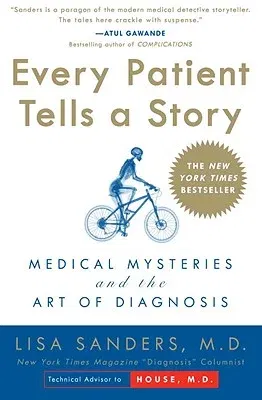A riveting exploration of the most difficult and important part of
what doctors do, by Yale School of Medicine physician Dr. Lisa Sanders,
author of the monthly New York Times Magazine column Diagnosis, the
inspiration for the hit Fox TV series House, M.D.
The experience of being ill can be like waking up in a foreign country.
Life, as you formerly knew it, is on hold while you travel through this
other world as unknown as it is unexpected. When I see patients in the
hospital or in my office who are suddenly, surprisingly ill, what they
really want to know is, 'What is wrong with me?' They want a road map
that will help them manage their new surroundings. The ability to give
this unnerving and unfamiliar place a name, to know it--on some
level--restores a measure of control, independent of whether or not that
diagnosis comes attached to a cure. Because, even today, a diagnosis is
frequently all a good doctor has to offer.
A healthy young man suddenly loses his memory--making him unable to
remember the events of each passing hour. Two patients diagnosed with
Lyme disease improve after antibiotic treatment--only to have their
symptoms mysteriously return. A young woman lies dying in the
ICU--bleeding, jaundiced, incoherent--and none of her doctors know what
is killing her. In Every Patient Tells a Story, Dr. Lisa Sanders takes
us bedside to witness the process of solving these and other diagnostic
dilemmas, providing a firsthand account of the expertise and intuition
that lead a doctor to make the right diagnosis.
Never in human history have doctors had the knowledge, the tools, and
the skills that they have today to diagnose illness and disease. And yet
mistakes are made, diagnoses missed, symptoms or tests misunderstood. In
this high-tech world of modern medicine, Sanders shows us that
knowledge, while essential, is not sufficient to unravel the
complexities of illness. She presents an unflinching look inside the
detective story that marks nearly every illness--the
diagnosis--revealing the combination of uncertainty and intrigue that
doctors face when confronting patients who are sick or dying. Through
dramatic stories of patients with baffling symptoms, Sanders portrays
the absolute necessity and surprising difficulties of getting the
patient's story, the challenges of the physical exam, the pitfalls of
doctor-to-doctor communication, the vagaries of tests, and the near
calamity of diagnostic errors. In Every Patient Tells a Story, Dr.
Sanders chronicles the real-life drama of doctors solving these
difficult medical mysteries that not only illustrate the art and science
of diagnosis, but often save the patients' lives.

